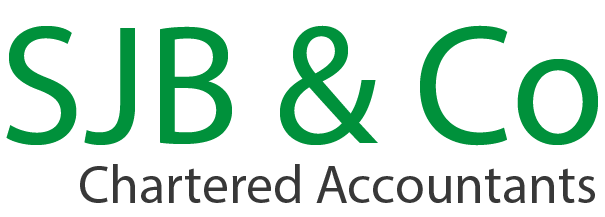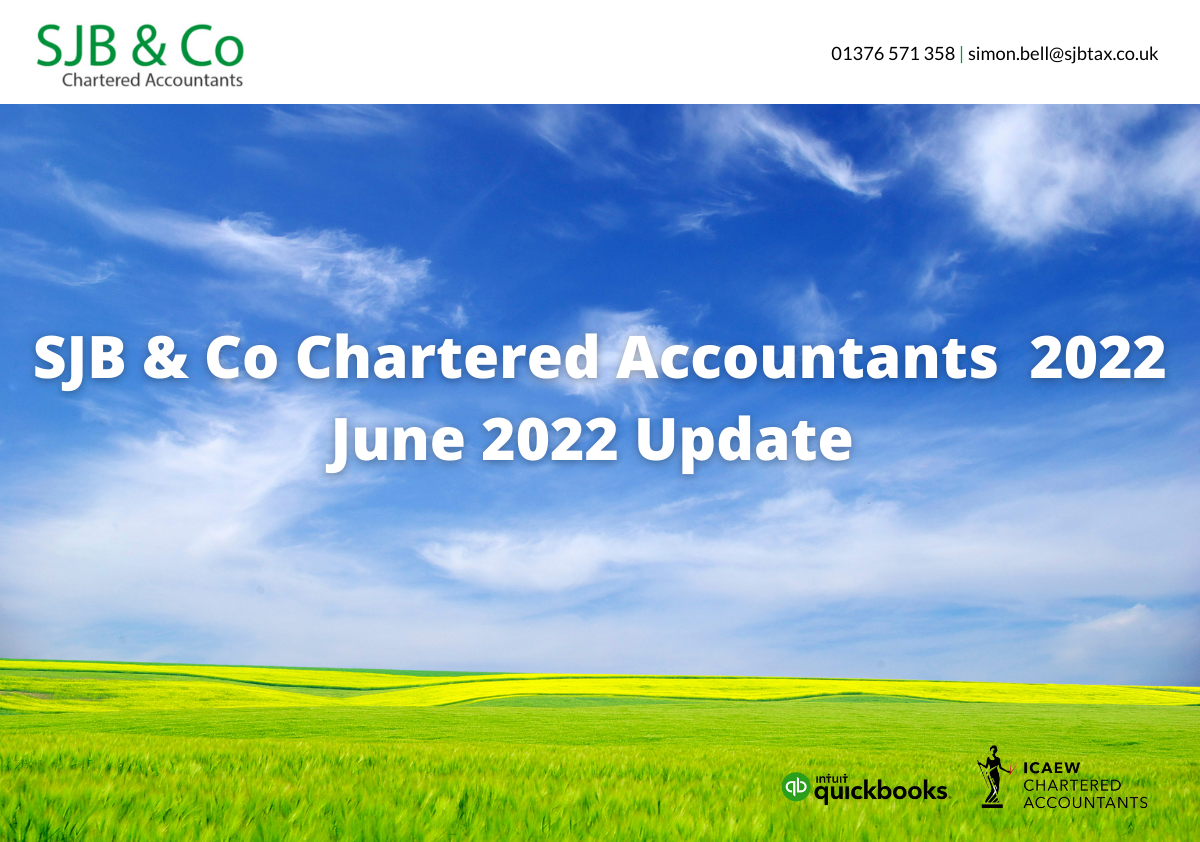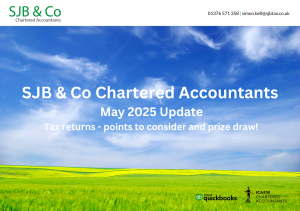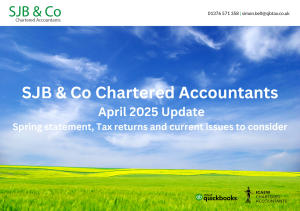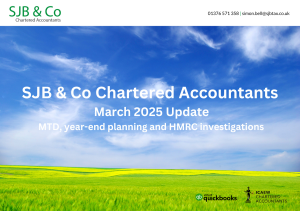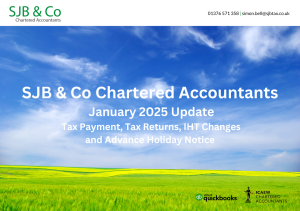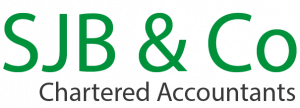Tax Returns!
We are now nearly two months into the new tax year and it is time to think about completing tax returns! Tax return information should be available with banks and brokers making annual reports available online or sending them out and employers issuing end of year details.
We are asking all clients to provide their tax return information by 31 July and no later than 30 September 2022. These dates are so that we can:
- Advise you of tax liabilities in good time to help you plan your cashflow;
- Allow us time deal with any issues arising from tax returns and any related planning required;
- We are aiming to submit all tax returns by 30 November this year, this will mean we can all enjoy Christmas without the thought of tax returns hanging over us!
- For sole traders and property owners who will be subject to Making Tax Digital and quarterly returns from April 2024 it is particularly important to be up to date with returns to ensure you are able to comply with the new system (we will be writing separately on this to those effected).
Clients are asked to forward their tax return details as soon as available. A big thank you to all those who have already sent in their tax information.
If individuals have to make their next payment on account of income tax by 31 July expect their income to have fallen for last year compared to the year before, payments on account may be reduced. It is recommended that last year’s tax return is completed before the end of July to determine the required payment on account. If you think this may apply to you please get in touch as soon as possible so we can prioritise your return if necessary.
Points to remember when completing tax returns
Income
Make sure you include all sources of income and capital gains. HMRC are increasingly identifying omissions in returns and are increasingly likely to seek penalties and interest where additional tax becomes due. Points to remember are likely to include:
- For earnings, a P60 certificate of earnings should be issued by the end of May and if you receive any benefits, you should receive a form P11D detailing the value of all benefits received which will need reporting;
- Members of employee share schemes should ensure they receive full details of what to report from their employer.
- Interest on all bank accounts and dividends from shares should be included on your return;
- Dividend income outside of ISAs should be reported, where dividends exceed £2,000 there will a charge to tax of 7.5% for basic rate tax payers, 32.5% for higher rate tax payers and 38.1% for additional rate tax payers.
- Rental income will need reporting, even if you are not making a profit it needs to be reported and a record of losses kept. It should be noted only the interest element of mortgage payments are deductible and an interest certificate should be obtained.
- If you have bought and sold cryptocurrency e.g. bitcoin then this is a taxable transaction though usually subject to Capital Gains Tax rather than income tax.
- If child benefit has been claimed and the income of either partner exceeds £50,000 this will need reporting and the higher income child benefit charge will apply.
Deductions
- Pension contributions – following recent rule changes contributions to all pension schemes and the increase in value of interests in final salary pension schemes need to be considered, if the total amount for any year exceeds the annual allowance then this may need to be reported on your tax return and a tax charge may arise. Members of final salary schemes should receive a letter from their scheme administrator advising them of the change in value of their pension rights and it is this information that will be required. Individuals whose adjusted total income exceeds £240,000 should be aware that the pensions annual allowance will reduce by £1 of each additional £2 of income with the annual allowance limited to £4,000 once income reaches £312,000.
- Higher rate tax payers paying personal pension contributions need to claim the additional tax relief through their tax return.
- Remember to include all gift aid payments to claim higher rate tax relief – this can include membership of the National Trust and similar organisations if gift aid declarations have been made.
- Employees who are paid less than the authorised mileage rates for business mileage can claim the difference between the amount received and the authorised rates – 45p per mile for the first 10,000 miles and 25p per mile thereafter via their tax return.
- Employees who pay their own professional subscriptions should claim the cost by including the cost on their tax return.
- investors in enterprise investment schemes and venture capital trusts will need to claim tax relief for the investments through their tax returns once they receive the appropriate tax certificate from HMRC.
- Marriage allowance – married couples can apply to transfer a proportion of their personal allowance between them, if your income is less than the personal allowance and your spouse is a basic rate tax payer you can apply to transfer 10% of your personal allowance, for 2021/22, this amounts to £1,260 and is worth £252.
Capital Gains
- Capital gains should be reported where the chargeable gain is expected to exceed the annual exemption (£12,300) or the proceeds exceed four times the annual exemption (£49,200).
- Sales of UK residential property other than houses fully qualifying for principle private residence relief should have already have been reported within 60 days of completion but will still need reporting on a self-assessment returns if completed.
- Transfers between spouses are generally exempt, however transfers to most close relatives other than spouses will be deemed to be connected party transactions taking place at market value. It is therefore possible for a capital gain to arise when a gift is made: for example: — if a parent gives a property to a child, there will be a capital gain to the extent that the market value of the property at the date of the gift exceeds the original cost.
- Capital gains can arise on the disposal of most assets, however there are some exemptions including: motorcars, personal effects and goods worth up to £6000 each, UK government stocks (gilts), assets held within an individual savings account, foreign currency for personal use and an individual’s principal private residence.
- If assets sold were held at 31 March 1982, then you can claim to use the market value at this date rather than original cost. Time should be allowed for obtaining a professional valuation, so that returns can be completed in good time.
- Where valuations are required to calculate the capital gain, it is possible to submit the valuations to HMRC for agreement in advance by submitting the form CG 34 to avoid subsequent enquiries and dispute.
If a capital gain has risen in the last tax year, there may still be scope for planning to shelter the capital gain, as capital gains can be deferred against investment in enterprise investment schemes undertaken in the 36 months following the disposal giving rise to the capital gain. Alternatively, if an individual has investments which have become of negligible value, then a claim can be made to treat the asset as disposed of to crystallise the loss and this can be effectively backdated up to 2 years. Ideally, we would recommend people consider their capital gains tax position prior to disposing of assets to maximise the opportunities for planning and we would be happy to assist clients with this.
Do you need to complete a tax return?
If you do not receive a request to complete a tax return it does not mean that you do not need to complete one. An individual needs to submit a tax return if they will have a liability to income tax or capital gains that will not be covered by tax deducted at source. Situations where a tax return may need to be completed for the first time may include:
- Self-employed income over £1,000
- Starting to receive untaxed income e.g. rental income from a buy to let property or untaxed investment income;
- Taxpayers receiving dividends in excess of the dividend allowance of £2,000 ( for last year) may need to complete a return as the excess over the £2,000 allowance will be subject to tax even for basic rate taxpayers.
- Investment income over £10,000.
- Taxable income in excess of £100,000.
- A disposal of assets (including gifts to family members) giving rise to a capital gain in excess of the annual exemption (£12,300 for 2021/2) or proceeds of £49,200
- Becoming a director.
There may also be situations where an individual may need to submit a return to ensure that they do not pay too much tax, typically this could occur when:
- An individual changes jobs during a year and the wrong PAYE code has been applied;
- For higher rate tax payers who need to claim relief for personal pension contributions and gift aid payments;
- Individuals with a number of different sources of PAYE income may pay too much tax via PAYE as the codes are frequently incorrect – typically this may apply to pensioners particularly for those with overseas pensions;
- Anyone needing to obtain tax relief for work related expenses e.g. professional subscriptions;
- Anyone paid mileage allowance for business travel at less than the authorised mileage rate of 45p / mile for the first 10,000 miles and 25p / mile thereafter can claim tax relief for the shortfall via their tax return.
We should be happy to discuss with readers if they have concerns over the need to file a tax return or think they may benefit from doing so. HMRC are increasingly keen to take people out of self-assessment, however individuals should be aware that it is still their responsibility to report new sources of income and that if relief is required for expenses a claim still needs to be made.
.
For more information or to discuss any issues raised above please contact Simon Bell by phone on 01376 571358 or email [email protected] .
Please feel free to forward this newsletter to any colleagues or friends who may be interested in it.
This newsletter is written in general terms and therefore cannot be relied on to cover specific situations; applications of the principles set out will depend on the particular circumstances involved and it is recommended that you take professional advice before acting or refraining from acting on any material in the newsletter.
